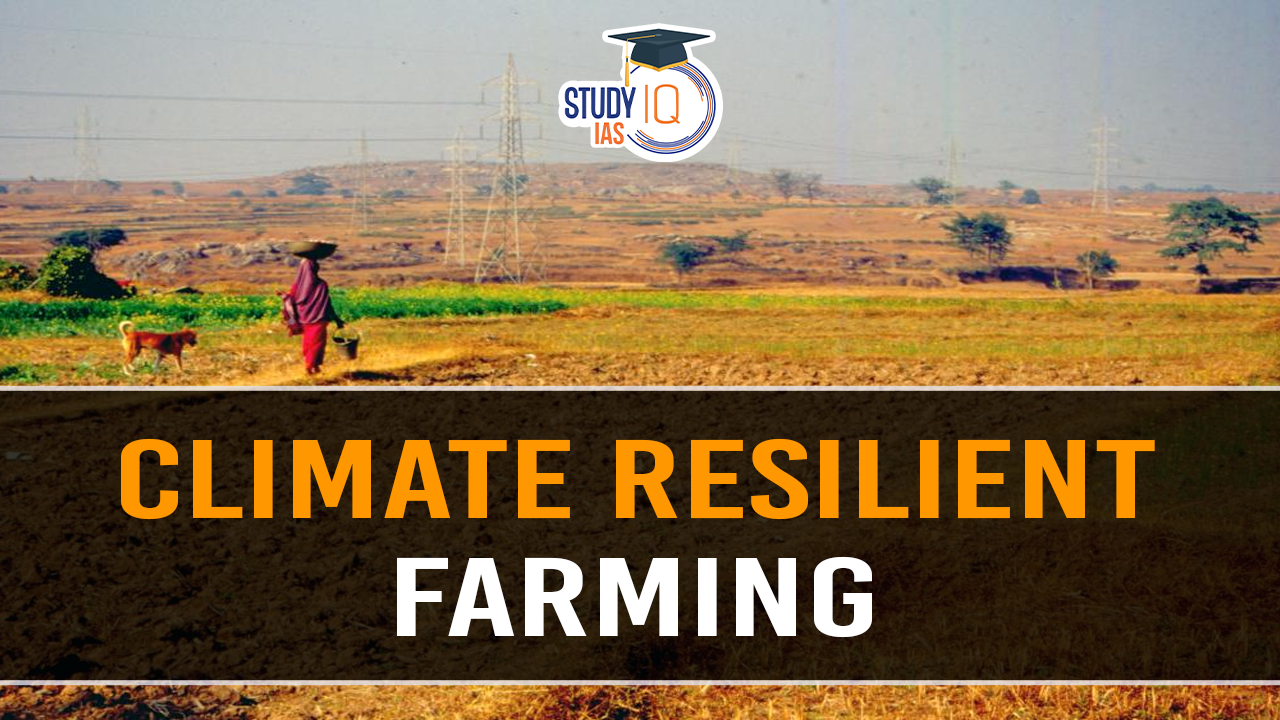Table of Contents
Context
In its 100-day agenda plan, Ministry of Agriculture and Farmers’ Welfare has decided to prepare 50k villages across 310 districts in India for climate resilient farming
About Climate Resilient Farming
- Climate resilient farming involves the incorporation of adaptation, mitigation, and other practices in agriculture to enhance the system’s ability to respond to climate-related disturbances.
- This includes resisting damage and recovering quickly from events such as extreme weather, droughts, and floods.
- Key practices include improved management of natural resources like land, water, soil, and genetic resources through the adoption of best practices.
Benefits of climate-resilient agriculture
- Increased food production and quality: This leads to improved nutrition and farmer income, especially for the 75% of the world’s poor who live in rural areas and rely on agriculture.
- Reduced vulnerability to climate stresses: Climate-resilient agriculture helps farmers cope with water scarcity, pests, extreme weather events, and long-term changes like shorter seasons.
- Lower greenhouse gas emissions: This approach reduces emissions from agriculture, avoids deforestation, and promotes methods to capture and store carbon dioxide from the atmosphere.
|
Related Fact |
| ● The agriculture sector accounts for approximately 14% of India’s total emissions.
● Significant greenhouse gas (GHG) emissions include methane (CH₄) and nitrous oxide (N₂O). ● The major sources of these emissions are: ○ Enteric Fermentation: 54.6% ○ Rice Cultivation: 17.5% ○ Fertilizer Application to Agricultural Soils: 19.1% ○ Manure Management: 6.7% ○ Field Burning of Agricultural Residues: 2.2% |
What Are the Challenges in Adopting Climate Resilient Farming In India?
- Financial Challenges: High costs associated with adopting new practices and technologies.
- Insufficient financial support, inadequate access to affordable credit, and insurance
- Technical Challenges: Limited access to advanced agricultural technologies and practices .
- Significant knowledge and training gaps among farmers regarding climate-resilient practices .
- Infrastructural Challenges: Inadequate water management infrastructure, including efficient irrigation systems.
- Outdated and insufficient irrigation infrastructure, particularly in drought-prone areas.
- Policy and Governance Challenges: Inconsistencies and gaps in policies aimed at promoting climate-resilient agriculture.
- Lack of effective coordination and implementation across different levels of government and sectors.
- One-size-fits-all policy approach that does not cater to the diverse agro-climatic zones.
- Social Challenges: Resistance to change among farmers due to traditional farming methods and uncertainty about the benefits of new practices .
- Ensuring equity and inclusion, particularly for marginalised groups such as smallholder farmers and women.
Way Forward
- Creation of Single Nodal Agency at National Level: Establish a single authority at the national level to address climate change issues impacting agriculture.
- Advanced Technology: Use AI-driven analytics and decision support systems to help farmers make informed decisions about weather patterns and soil conditions.
- Example: Weather Information Network Data System (WINDS).
- Adoption of Heat Tolerant Varieties: Promote heat-tolerant crop varieties.
- Examples: HDCSW-18 and DBW-187 (wheat varieties) by Punjab farmers; CR Dhan 201, NICRA Aerobic Dhan 1, and CR Dhan 412 (rice varieties).
- Better Livestock Feed Management: Improve feeding methods by altering feeding times or frequency, modifying diet composition, and training producers in feed production and conservation for different agro-ecological zones.
- Water Management: Implement groundwater recharge techniques, adopt scientific water conservation methods, adjust fertilizer and irrigation schedules, and modify planting dates.
- Upscaling Proven Resilient Practices: Nationwide adoption of Climate Resilient Villages (CRVs) models established under the NICRA project.
- Implementation of GHG Reduction Measures in Agriculture: System for Rice Intensification (SRI) can increase rice yield by 36-49% while using 22-35% less water.
- Awareness at Panchayat Level: Educate Sarpanches about the effects of climate change on agriculture to act as force multipliers and educate farmers, who are the frontline warriors.


 World Summit on Disaster Management (WSD...
World Summit on Disaster Management (WSD...
 Domestic Systemically Important Banks (D...
Domestic Systemically Important Banks (D...
 The Missing Link in India’s Critical M...
The Missing Link in India’s Critical M...

























